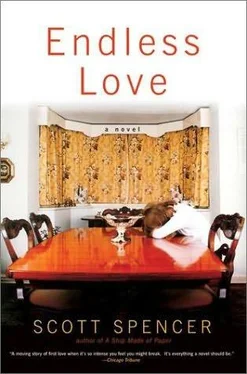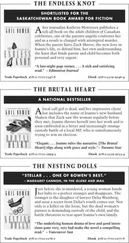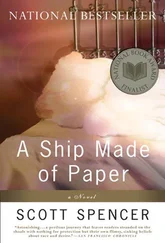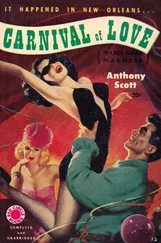I sat with my forehead pressed onto the window and my full weight was supported by one sheet of glass. With a sudden recoil I sat up straight—I’d imagined myself tumbling out. I looked out at the street again and then pulled down the shade.
The room was mostly dark now and I stood in that darkness. Soon, I knew, I would be ransacking the apartment looking for those few letters, but the search would have to wait. I’d have to be alone. And time passed so slowly—there was no reason to hurry. For the moment it was all I could do to stand where I was, in my stuffy, stupid room, and feel the tears—when had they started?—rolling down my face. I hoped my parents wouldn’t barge in and find me like this. But there was no question of stopping myself. I hadn’t the strength, nor the cunning disregard for the self’s deepest wound. I sat on the bed and blindly groped for the pillow. I wrenched it free from the covers and pressed it to my face. Then I opened my throat to its full aching aperture and sobbed into that soft mound and its millions of feathers.
Rose worked as a librarian in a high school on the Southwest Side, and because it was summer and the time of her vacation, it fell to her to remain home with me during those first humid days of my return. Eventually, I would have no choice but to put my life in order. My release from Rockville was only a new kind of parole. I was required to see a psychiatrist twice weekly, remain in contact with a parole officer, and either enroll in college or get a full-time job. I was not to leave Chicago without the court’s permission and I was not to make any attempt to contact any of the Butterfields. But in the meanwhile, I lurked about the apartment, sleeping late, watching TV, and eating with the blind cosmic appetite of an enormous parasite. How Rose suffered my languor. She believed in will power as deeply as Galileo believed in gravity, and the overgrown boy in cocoa brown pajamas staring at reruns of “The Lucy Show” was the apple that falls from the tree only to hover in mid-air.
The weather was repulsive. The temperature was in the nineties and the sky was the color of soiled bandages. Our air conditioners were on perpetually and they dripped cool gray water into the pans we’d placed beneath them. Everything felt damp and slightly soft; the ink from the newspapers came off on your hands.
I could not bring myself to leave the house. I slept as late as I could. When I woke I’d force myself back to sleep, pushing my consciousness back down with the hunger of a man licking the last crumbs off of his plate. Then, when I couldn’t take my bed or my room any longer, I’d stagger into the living room, turn on the TV, and lie on the couch, picking at a bunch of oblong green grapes or devouring a box of Ritz crackers. Rose tried to get me to go out. She suggested lunch at a nearby restaurant; she looked at the movie listings with me and asked me what I wanted to see. She claimed to have made appointments for me—with her friend Millicent Bell, who worked at Roosevelt University, or with Harold Stern, who had offered to get me a job with the Amalgamated Clothing Workers union. But I wasn’t ready to leave the house and I told her. I never noticed her making a call to cancel one of these so-called appointments; I suppose she was trying to appeal to my sense of order or trying to make me feel there were real live people out there, waiting to see me and make my life real. She offered to take me shopping and when I refused that, she went to my room and took all of my old clothes out. She brought them into the living room and dropped them on the floor and forced me to go through each piece and decide with her that practically none of them fit me any longer—I’d gotten taller in Rockville and I wasn’t quite thin any longer. This was on my third day home, and after I admitted that my clothes didn’t fit me—and assured her that quite soon I would allow her to buy me new ones—Rose gathered them in her arms to dispose of them in the cellar.
“You could give them away, you know,” I called after her as she lugged them toward the door.
“Charity is for the ruling class,” she answered.
“Sharing’s not!” I shouted, suddenly electric with frustration and shame.
I listened to her heels clatter down the stairs. For the first time since arriving home, I was truly alone in the apartment. I had searched my room and hadn’t found any of the old letters to and from Jade, and now at last I could look elsewhere. I ran to the bookcases and opened the sliding cabinet doors at their base: folded tablecloths; aqua and burgundy burlap napkins from Mexico; a few old copies of The National Guardian; a chessboard and a White Owl cigar box for the chess pieces; dozens of little boxes of delicate pink birthday candles; boxes of checks; boxes of unsharpened pencils; a portable sewing kit, housed in heavy, shiny paper and decorated by a drawing of an elephant waving its trunk; envelopes; empty spiral notebooks. Just the kind of innocent, chaotic accumulation that at another time might have made me grin with pleasure—my parents’ hidden clutter was utterly beyond reproach. It was like prying open a locked diary only to read recipes and descriptions of nature, or hearing someone murmur in his sleep, “I must remember Ezra’s birthday.”
I closed the cabinets, turned on the TV, and flung myself onto the sofa, trembling in the wake of the missed opportunity. Rose stalked back into the apartment. I could tell that her temper had subsided and she no longer had the impulse to remove my old clothing, but she still had another armload to go and it would have been too complicated not to follow through. She avoided my eyes and gathered the last of them and was gone.
I raced into my parents’ bedroom. Even on bright days it was a dark room but today it looked submarine. I switched on the overhead light, which was covered with a convex square of cloudy cut glass. There had never been any sign of activity in that room. They dressed and undressed in the bathroom down the hall. There was no desk, no telephone, and the only chair was an old wooden one pressed against the wall, which had never, as far as I knew, supported human weight. The floors were carpeted and the bed stood in the middle of the room, between a closet on one side and a dresser on the other. There were two Irv Segal lithographs of toiling hands on the wall but no mirror. The bed itself was made so tightly that it looked as if you’d need a penknife to roll back the covers at night. Racing both against time and my own admonishment, I searched through their yellow lacquered dresser. What unvarying innocence! First drawer: socks, shorts, tee shirts, handkerchiefs, and a bottle of Arrid deodorant that Arthur evidently felt was too personal to store in the common medicine cabinet. Second drawer: Arthur’s shirts. Third drawer: nylon stockings, one pair still attached to a garter belt, brassieres, panties, a lady’s shaving kit. Fourth drawer: an empty wristwatch case, an empty photograph frame with its glass cracked, and stacks of manila envelopes. For a few pounding moments I was certain I’d found my letters. But the envelopes held canceled checks, old income-tax statements, snapshots of me as an infant and a child, old leases, automobile registrations, insurance forms, a loan agreement from the Hyde Park Bank, an envelope marked “Arthur’s Will”…
“What now?” said Rose.
I was seated on the floor and the envelopes were in my lap. I was silent for a moment, wondering without terribly much fear if inspiration might present me with a brilliant alibi. I had never had any deep attachment to the truth, especially when my personal welfare was at stake. Yet since having confessed to starting the fire on the Butterfields’ porch, my sense of personal protection had become sporadic: I rarely felt that more damage could be done to my life than had already been done. “I’m looking for my letters,” I said. “My old letters to Jade.” I looked up at my mother, prepared for her fury—the only part of my parole she approved of was the stipulation I keep the Butterfields out of my life. I was ready to be screamed at, slapped, even threatened with being sent back to Rockville; I was ready for tears, for panic and grief and even compassion. It really didn’t matter to me.
Читать дальше












